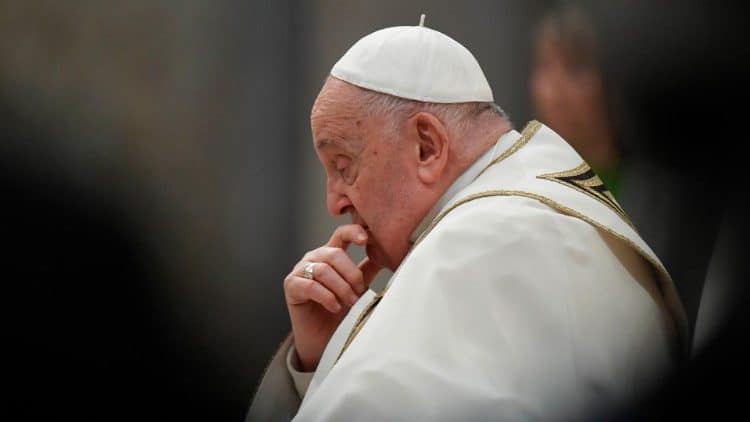“There was the Oslo agreement, very clear, with the two-state solution. Until that agreement is implemented, true peace will remain distant.” It is the judgment on what is happening in the Holy Land, after the attacks by Hamas and the war that is destroying the cities of the Gaza Strip, that Pope Francis entrusts to Domenico Agasso, Vatican correspondent of the Italian newspaper La Stampa, in the interview published this January 29, and available on newsstands. Francis, speaking of the numerous ongoing conflicts, invites people to pray for peace, points out dialogue as the only way and asks to “immediately stop the bombs and missiles, and put an end to hostile attitudes.” In all places, a “global ceasefire” because “we are on the brink of the abyss.”
Hopes for the Holy Land and Ukraine
The Pope explains his opposition to defining a “just” war, preferring to say that it is legitimate to defend oneself, but avoiding “justifying wars, which are always bad.” He states that he fears a military escalation, but that he cultivates some hope “because confidential meetings are being held to try to reach an agreement. A truce would already be a good result.” Pope Francis defines Cardinal Pizzaballa as “a crucial figure”, who “moves well” and tries to mediate, remembers to make video calls every day to the Gaza parish and also affirms that “the release of the Israeli hostages” is a priority . Regarding Ukraine, in the interview the Successor of Peter recalls Cardinal Zuppi’s assignment: “The Holy See tries to mediate for the exchange of prisoners and the return of Ukrainian civilians. In particular, we are working with Lady Maria Lvova-Belova , the Russian Commissioner for Children’s Rights, for the repatriation of Ukrainian children forcibly brought to Russia. Some have already returned to their families.”
Fiducia Supplicans want to include
In the interview, the Holy Father remembers that “Christ calls everyone to enter” and referring to the Declaration Fiducia Supplicans that allows blessings for irregular and same-sex couples, he explains: “The Gospel is to sanctify everyone. Of course, always that there be good will. And it is necessary to give precise instructions about the Christian life (I emphasize that it is not the union that is blessed, but the people). But we are all sinners: why then make a list of sinners who can enter into the Church and a list of sinners who cannot be in the Church? This is not the gospel. Regarding criticism of the document, the Pope observes that “those who protest vehemently belong to small ideological groups,” while defining the Africans as “a separate case” given that “for them homosexuality is something ‘bad’ from a cultural point of view.” From our point of view, they do not tolerate it. But overall, he “trusts that little by little everyone will be reassured by the spirit of the declaration” which “aims to include, not divide.” He invites us to welcome and then entrust people, and ourselves, to God. Francis admits that sometimes he feels alone, “but I always move forward, day after day” and says that he is not afraid of schisms: “There have always been small groups in the Church that expressed schismatic reflections… you have to let them do that, and it passes… and look forward.”
Artificial intelligence, opportunities and dangers
The Pope then addresses the topic of his recent message for the World Day of Social Communications, dedicated to artificial intelligence, which he defines as “a good step forward that can solve many problems, but potentially, if managed unethically, it can also cause much harm to man.” The objective is that “it is always in harmony with the dignity of the person”, otherwise “it will be suicide.”
The next trips
The Pontiff says he feels well, despite some aches and pains, and is not thinking about resigning for the moment. He remembers upcoming trips to Belgium, East Timor, Papua New Guinea and Indonesia in August. He defines the hypothesis of the trip to Argentina as “in parentheses”, saying that he was not offended by Milei’s words during the electoral campaign and confirming that he will meet with the new president in the coming days, immediately after the expected canonization of the Argentine saint “Mamá Antula” for February 11. I’m ready to talk to him.
The Church of the future and the Conclave of 11 years ago
After remembering the World Children’s Day, who “are teachers of life” and must be listened to, the Pope reiterates his dream of “a Church on the way out” and remembers what happened after his words pronounced in the general congregations that preceded the Conclave 2013: “After my speech there was an unprecedented applause in this context. But I had not at all intuited what many would reveal to me later: that speech was my “condemnation” (smiles, ed.). When I left the Synod Hall, there was an English-speaking cardinal who saw me and exclaimed: “What you said is beautiful! Elegant. Elegant. We need a Pope like you!” But I did not realize the campaign that was beginning to elect me. Until lunch on the March 13, here at Casa Santa Marta, a few hours before the decisive vote. While we were eating, they asked me two or three “suspicious” questions… Then in my head I began to tell myself: “Something strange is happening here…” “But I still managed to take a nap. And when I was chosen, I had a surprising sense of peace within me.” Finally, Pope Francis confesses to La Stampa that he feels like “a parish priest.” From a very large, global parish, of course, but I like to maintain the spirit of a parish priest. And be among the people. Where I always find God.










